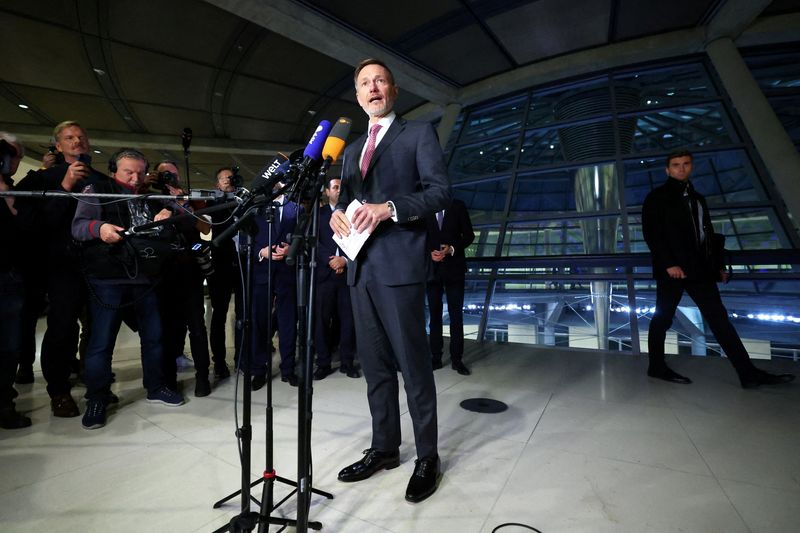By Maria Martinez
BERLIN (Reuters) – The collapse of Germany’s ruling coalition is set to bring more economic pain in the months ahead and just a glimmer of hope for Europe’s ailing economic giant if, and that is a big if, it can lead to a less fractious government and more coherent policies.
The break-up came at a critical juncture for Europe’s biggest economy, just hours after Donald Trump won the U.S. presidential election, raising the spectre of a tit-for-tat trade war with Germany’s main trading partner.
Chancellor Olaf Scholz on Wednesday sacked his finance minister, paving the way for a snap election after months of bickering in his three-party coalition that has further hurt confidence in an economy struggling with high energy costs and eroding competitiveness.
The world’s third-largest economy has lagged the European Union average since 2021 and is expected to shrink for the second year running in 2024, making it the worst performer among the Group of Seven major economies.
The coalition collapse is likely to deal another blow to consumption and investment in coming months, already poised to decline, with a third of German companies indicating in a recent survey plans to scale it back.
“In combination with the Trump win, economic confidence is likely to drop significantly and makes a contraction of the economy in the fourth quarter more likely,” said Carsten Brzeski, global head of macroeconomics at ING.
He said the following quarter would bring more weakness, possibly further contraction, but maybe also a much-needed fresh impulse.
“With elections coming in March, hope is that the new government will bring an end to the economic paralysis and provide finally economic policy guidance and certainty,” Brzeski said.
Scholz plans to hold a parliamentary confidence vote in his government on Jan. 15, which could trigger snap elections by the end of March. Until then, he is expected to head a minority government with his Social Democrats (SPD) and the Greens, relying on cobbled-together parliamentary majorities to pass legislation.
Right now Christian Democrat (CDU) conservatives lead in the polls, but there is currently no polling majority for a purely centre-right or centre-left coalition. That suggests that finding policy compromises might prove equally hard in the future, JP Morgan analyst Greg Fuzesi said.
“In this sense, we note new elections will result in a similar government,” he said.
Yet there is an argument to be made that any new government can provide the economy at least some momentum.
“Once the dust settles and a new government with a new and fresh agenda takes power after snap elections, the impact will likely be positive,” Holger Schmieding, chief economist at Berenberg, said.
In the near term, a likely delay in next year’s budget, means no spending on new projects, though some outlays such as more aid for Ukraine could still pass. The cabinet agreed on the budget in the summer and it was due for parliamentary approval before year-end, but now could get pushed back until mid-2025.
NO BRAKE?
But ultimately the departure of finance minister Christian Lindner could allow more spending to prop up the flagging economy. Lindner, of the free-market Free Democrats (FDP), opposed Scholz’s plans to suspend the debt brake which limits public debt.
Scholz has argued that Germany has sufficient leeway to spend without compromising the health of its finances.
“Among all large economically strong democracies, we have by far the lowest debt,” Scholz said on Wednesday. “There are solutions for how we can finance our public institutions and responsibilities soundly.”
Germany’s public debt is seen at 64% of its economic output in 2024 with the budget deficit of 1.75% gross domestic product, well below the EU’s 3% limit. Meanwhile, France expects its debt-to-GDP ratio to hit 113% this year and Italy of 135%.
Alongside its budget draft, the government also adopted a growth package of 49 measures it said could generate additional growth of more than half a percentage point in 2025.
The plans must be approved by parliament this year to be implemented, meaning the coalition government needed votes from opposition conservatives in the upper house, which represents Germany’s 16 federal states.
Scholz said he would speak with CDU opposition leader Friedrich Merz to discuss possible cooperation on steps needed to boost Germany’s economy and defence.
“Our economy cannot wait until new elections are held,” Scholz said.
Trump’s upcoming presidency underscores the urgency.
A report by German economic institute IW found that in a scenario where the new U.S. administration imposed tariffs of 20% on the EU, as Trump has signalled during his campaign, and the bloc retaliated in kind, Germany’s export-dependent economy could shrink as much as 1.5% in 2027 and 2028.
Current forecasts show the economy poised for stagnation or further contraction next year, which would make it the longest spell without economic growth since Germany’s reunification in 1990.
While ING’s Brzeski now expects a 0.1% contraction, Schmieding is more optimistic that a fresh start with the new government could help the economy recover from a likely first-half slump.
“A further contraction in GDP for 2025 as a whole is possible, but it is not my base case,” Schmieding said.




























